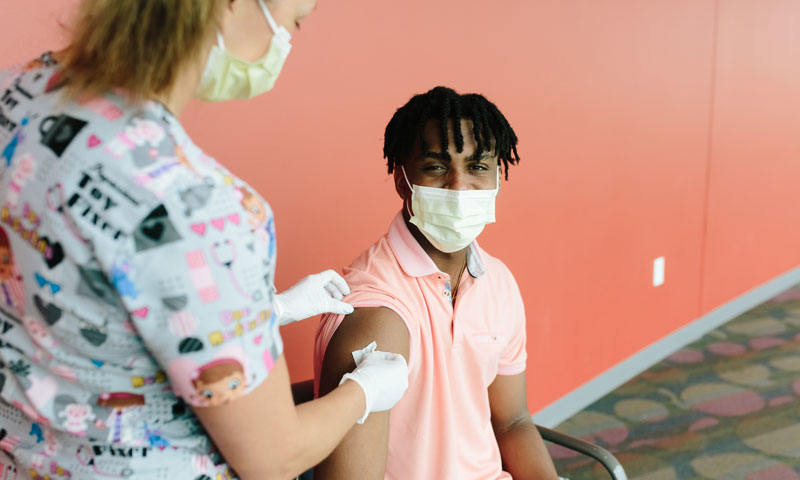The advent of COVID-19 vaccines has been a significant milestone in the fight against the global pandemic caused by the SARS-CoV-2 virus. These vaccines have proven to be highly effective in reducing the severity of illness, hospitalizations, and deaths associated with COVID-19. However, as with any medical intervention, concerns and questions have arisen regarding potential side effects and complications, including the possibility of cardiomyopathy. This article aims to explore whether the COVID-19 vaccine can cause cardiomyopathy, drawing on current research and expert opinions in the field of cardiology.
COVID-19 And Cardiomyopathy
Cases of myocarditis and pericarditis after COVID-19 vaccines are rare: mostly reported in males under 40 years of age, after the second dose. Cases do occur in both females and males, at any age, and after any dose, including a third or fourth dose.
COVID-19 itself has been associated with a range of cardiovascular complications, including myocarditis, pericarditis, and cardiomyopathy. The virus can directly infect heart tissue, causing inflammation and damage. Additionally, the systemic inflammatory response triggered by severe COVID-19 can exacerbate existing cardiovascular conditions or contribute to new cardiac events.
see also: How Long Does It Take for Myocarditis to Kill You?
COVID-19 Vaccines And Myocarditis
Myocarditis, an inflammation of the heart muscle, has been reported as a rare side effect of mRNA COVID-19 vaccines (Pfizer-BioNTech and Moderna), particularly in younger males. The symptoms of myocarditis include chest pain, shortness of breath, and palpitations. In most cases, myocarditis following vaccination has been mild and resolved with treatment. Given the overlap between myocarditis and cardiomyopathy, it is essential to examine whether vaccine-induced myocarditis could lead to cardiomyopathy.
Current Evidence on COVID-19 Vaccines And Cardiomyopathy
Studies and Surveillance Data
Clinical Trials: The clinical trials for COVID-19 vaccines did not show an increased incidence of cardiomyopathy among participants. However, post-authorization surveillance has been crucial in identifying rare adverse events that may not have been apparent in initial trials.
VAERS Reports: The Vaccine Adverse Event Reporting System (VAERS) in the United States has received reports of myocarditis and pericarditis following mRNA vaccination. However, the incidence is extremely low compared to the number of vaccines administered.
Most cases have occurred in young males aged 16-30 years, and the majority of patients have recovered fully with appropriate medical care.
Studies on Myocarditis: Several studies have focused on myocarditis following COVID-19 vaccination. For example, a study published in JAMA Cardiology found an increased risk of myocarditis following mRNA vaccination, particularly after the second dose. However, the absolute risk remains low, and the benefits of vaccination in preventing COVID-19 far outweigh the risks of myocarditis.
Long-term Follow-up: Long-term follow-up studies are ongoing to assess whether myocarditis cases associated with COVID-19 vaccination lead to lasting cardiac damage or cardiomyopathy. Early results suggest that most myocarditis cases resolve without significant long-term effects.
Mechanisms of Vaccine-induced Myocarditis
The exact mechanisms by which mRNA vaccines may cause myocarditis are not fully understood, but several hypotheses have been proposed:
Immune Response: The robust immune response triggered by mRNA vaccines may, in rare cases, cause an exaggerated inflammatory reaction in the heart muscle.
Molecular Mimicry: There may be molecular similarities between the spike protein encoded by the mRNA vaccines and certain heart tissue proteins, leading to an autoimmune response.
Direct Cardiotoxicity: While unlikely, there is a theoretical possibility that components of the vaccine could have a direct toxic effect on heart cells.
Risk-Benefit Analysis
Benefits of COVID-19 Vaccination
Prevention of Severe COVID-19: Vaccination significantly reduces the risk of severe illness, hospitalization, and death from COVID-19. This benefit is particularly crucial for individuals with underlying health conditions, including cardiovascular disease.
Reduction in Long-term Complications: Preventing COVID-19 also reduces the risk of long-term complications, such as long COVID, which can include cardiovascular symptoms and potential cardiac damage.
Risks of COVID-19 Vaccination
Rare Cases of Myocarditis: While there is a small risk of myocarditis following mRNA vaccination, it is important to note that the condition is generally mild and treatable.
Monitoring and Management: Healthcare providers are vigilant in monitoring and managing any cases of myocarditis that arise, ensuring prompt and effective treatment.
Professional Recommendations
Cardiology Associations
Major cardiology associations, including the American Heart Association (AHA) and the American College of Cardiology (ACC), have reviewed the data on COVID-19 vaccines and myocarditis. They continue to endorse vaccination for eligible individuals, emphasizing that the benefits far outweigh the risks.
Public Health Agencies
Public health agencies, such as the Centers for Disease Control and Prevention (CDC) and the World Health Organization (WHO), also support vaccination, including for those with a history of myocarditis, after considering individual risk factors and benefits.
Conclusion
The current evidence suggests that while there is a rare risk of myocarditis following mRNA COVID-19 vaccination, there is no conclusive evidence that the COVID-19 vaccine causes cardiomyopathy. Most myocarditis cases are mild, treatable, and resolve without long-term consequences. The benefits of COVID-19 vaccination in preventing severe disease, hospitalizations, and deaths far outweigh the risks of rare adverse events.
Ongoing research and surveillance are essential to monitor the long-term effects of vaccination and ensure the continued safety of COVID-19 vaccines. As a cardiologist, it is crucial to stay informed about the latest data and provide patients with accurate, evidence-based information to make informed decisions about vaccination.

